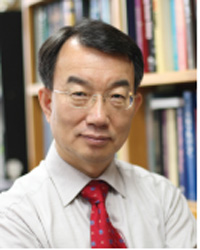The Ministry of Education, Science and Technology announced that the new gene, Twenty-four’s mechanism has been discovered by the researchers at KAIST for the first time in the world. Twenty-four was discovered by Professor Joonho Choe’s research team, and Doctor Lee Jong Bin from the Department of Biological Sciences at KAIST, through a collaborative research project with Northwestern University. The results of the discovery were published in Nature, the world renowned scientific journal, on February 17.
 | ||
| ▲ Professor Joonho Choe | KAIST PR Team | ||
The achievement is noteworthy in that a research institute trained domestically has taken the lead in this field. According to the research team, after four years of observing transforming agent genes in Drosophila, they discovered that a previously unknown gene Twenty-four exists in a nerve cell that controls a Drosophila brain’s biological rhythm. Unlike other genes that interfere with biological rhythm during the transcription phase, Twenty-four acts in the next phase where mRNA is transformed from a ribosome into a protein. Twenty-four has been found to affect Period proteins, the most important gene that controls the biological rhythm. This discovery provided scientific proof of how a protein produced by this gene functions in a nerve cell. It is different from other genes’ mechanism and is currently deemed ground breaking in the research field of biological rhythm.
This research has the potential of solving many problems related to biological rhythm, such as sleep disorders, jet-lag, eating habits, and other physiological phenomena. Professor Choe said, “The findings we’ve made are meaningful in that we have found a new mechanism of controlling the biological clock by showing that biological rhythm is occurring in a gene transformation stage.” The research team named the new gene Twenty-four based on the fact that its period is twenty-four-hours long and the sum of its gene number, CG4857, is twenty-four.
Correction (3/24/2011): The previous version of this article incorrectly spelled Professor Joonho Choe's name and apologizes for the mistake.

